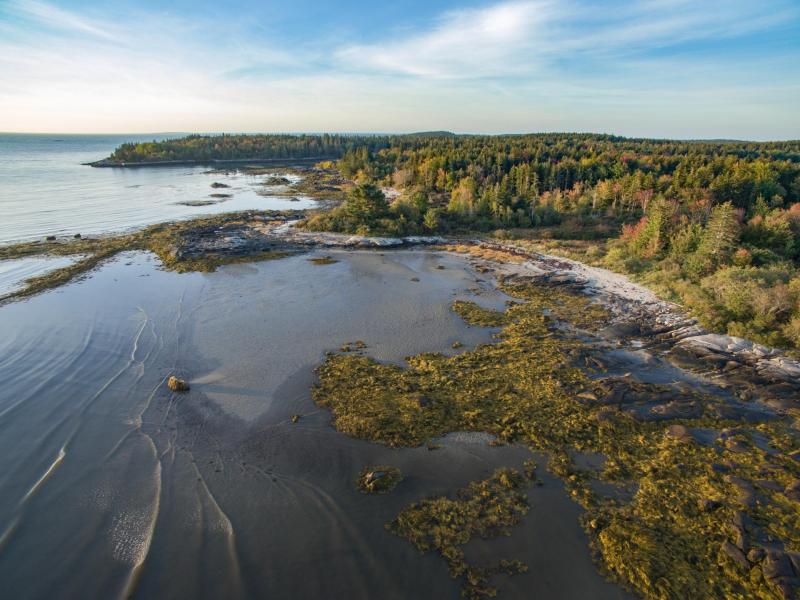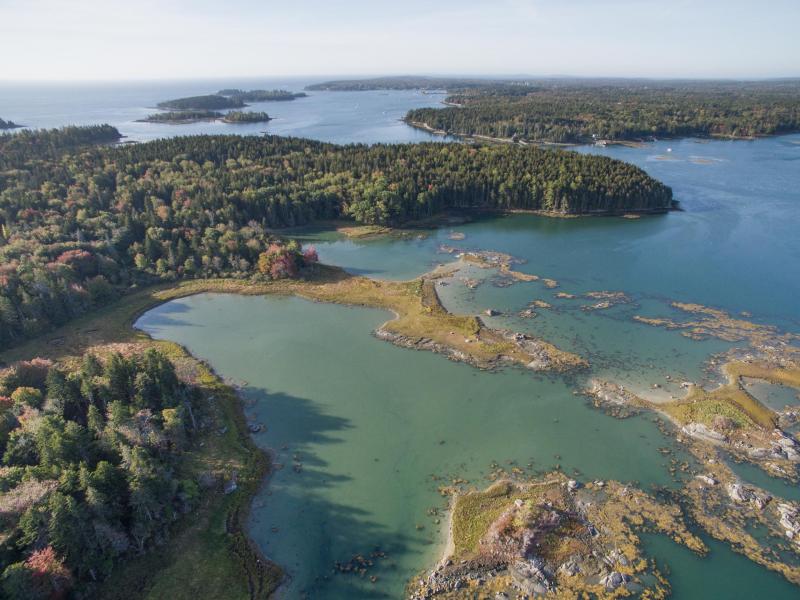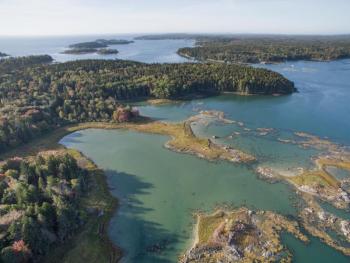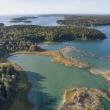Federal government donates $1 million toward Clark Island protection, a Maine Coast Heritage Trust project
WASHINGTON, D.C. — The Maine Department of Inland Fisheries and Wildlife has been awarded $1 million from the Department of the Interior’s National Coastal Wetland Conservation Grants program to help buy acreage of Clark Island land abutting the existing MDIFW conservation easement in Saint George.
The site is to be a preserve that protects bird habitats and enhances wildlife-oriented recreation.
Clark Island has long been a destination as a place to walk, hike, and beach-comb. It is home to a settlement dating back to the 1780s, and quarrying operations beginning in the 1830s.
By 1890, 100 stone cutters and their families, plus supporting crews of quarrymen and sculptors, along with 51 children, lived on Clark Island.
In 1892, the town of Saint George paid for a granite causeway from the mainland to Clark Island, and by 1900, 400 people –300 of them stone cutters – were employed in the quarry operation. Today the island is mostly undeveloped with just a few remaining residences.
Many visitors assume the island is public and protected from development when, in fact, it is privately owned and public access is not yet guaranteed for the future. The current landowners hope to sell Clark Island to MCHT and ensure that the tradition of public access and recreation they have voluntarily granted for decades will be permanently assured. MCHT has entered into an option agreement with the current landowners, which allows until April 2020 to raise the $4.8 million required to purchase and assure its long-term future as a public preserve. $1.1 million still needs to be raised to complete the project. Now, thanks to a handful of generous lead donors and the MCHT Board of Directors, new gifts toward remaining fundraising goal will be matched dollar for dollar (up to $2 million).
MDIFW will work with Maine Coast Heritage Trust as a subrecipient for the Clark Island Wetlands Conservation Project.
The Clark Island Project involves raising $4.8 million by March 2020 to purchase and put 85 percent of the 175-acre island into permanent protection, and 120 acres of that secured for public access.
In fall 2017, Maine Coast Heritage Trust entered into an option agreement with the landowners to purchase and conserve the majority of Clark Island and open it to the public as a preserve.
Maine Coast Heritage Trust President Tim Glidden commented on the grant award: “We are extremely fortunate to receive this Coastal Wetlands Grant, and we are grateful to Maine’s Congressional Delegation for helping make it possible. It is support like this that make coastal conservation happen, and keeps the coast healthy and open to all.”
As one of the few remaining un-fragmented coastal habitat blocks in the region, Clark Island supports a diversity of marine and terrestrial wildlife. Much of the intertidal salt marsh, mudflat, and beach natural community types are designated as Significant Tidal Waterfowl and Wading Bird Habitat by the Maine Department of Inland Fisheries and Wildlife.
“For decades Clark Island’s owners graciously allowed visitors to enjoy the sandy beaches, tide pools, and trails, and many have done so without realizing access is not guaranteed, that the property could be sold, developed, and cut off to the public,” according to the Maine Coast Heritage Trust. “Maine Coast Heritage Trust is working to make sure that doesn’t happen.”
Pingree is the Vice Chair of the House Appropriations subcommittee on Interior-Environment which has oversight of the US Fish and Wildlife service, an agency within the Department of the Interior.
Maine Congresswoman Chellie Pingree, who is the Vice Chair of the House Appropriations subcommittee on Interior-Environment, which has oversight of the US Fish and Wildlife service, an agency within the Department of the Interior, said in a news release: “I’m excited to see that the Department of the Interior understands just how special Clark Island is—and how important it is to protect it. Clark Island is a wonderful treasure on Maine’s coast and is readily accessible to the general public. This means that generations of Maine visitors have been able to appreciate and experience Clark Island, and the DOI conservation grant ensures future generations will be able to share in that experience.”
Greg Soutiea, who along with his wife Lauren, bought the Craignair Inn and Restaurant, in Tenants Harbor, in December, said he witnesses daily the importance of Clark Island. The inn and restaurant are adjacent to the causeway that leads to the island.
"I see how special the place is to the local community," Soutiea said, in a news release.
He said every day, including in the winter, people walk out onto the island. The conservation of Clark Island, Soutiea said, will allow locals and visitors an opportunity to experience the wonders of Clark Island. “We’d hate to see that access get cut off.”
The National Coastal Wetlands Conservation Grant Program from the U.S. Fish and Wildlife Service’s Wildlife and Sport Fish Restoration program provides funding for long-term conservation and protections of coastal wetland ecosystems, for wildlife and the public.
MCHT is grateful that the owners agreed to sell the property for $400,000 less than appraised value to help jump-start fundraising efforts. MCHT seeks to raise an additional $1.1 million by April of 2020 to purchase the 120 acres on Clark, and to assure long-term stewardship of the property. Those interested in donating to the effort should contact David Warren at MCHT (607-4365).
About Maine Coast Heritage Trust
Maine Coast Heritage Trust is a statewide land conservation organization committed to protecting the character of Maine. Since 1970, Maine Coast Heritage Trust has helped conserve more than 150,000 acres in Maine, from the Isles of Shoals to Cobscook Bay, including more than 300 entire coastal islands. For more information, visit www.mcht.org.
Event Date
Address
United States




























